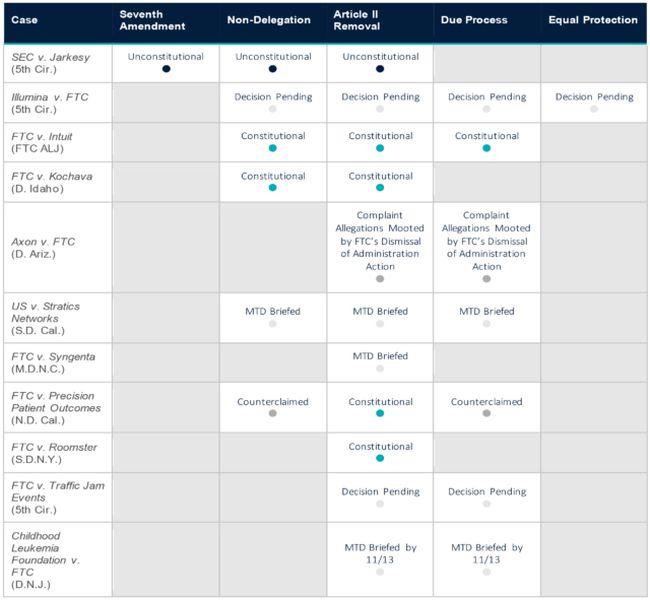In recent years, independent agencies have continued to face a number of constitutional and statutory challenges before the Supreme Court. AMG Capital Management struck down the Federal Trade Commission's authority to obtain equitable monetary relief under Section 13(b). Seila Law severed the Consumer Finance Protection Bureau (CFPB) commissioner's for-cause removal protections. This term, the Supreme Court will determine whether the CFPB's funding structure is constitutional in CFPB v. CFSA. And, as we've previewed earlier this year, the Court will weigh three constitutional challenges to the SEC in SEC v. Jarkesy.
A quick primer: The Supreme Court will review three constitutional infirmities that the Fifth Circuit determined that the SEC suffered. First, the Fifth Circuit held that when the SEC brought claims for civil penalties in administrative proceedings, it deprived Jarkesy of its Seventh Amendment right to a jury trial. Second, the Fifth Circuit held that Congress unconstitutionally delegated legislative powers to the SEC without an "intelligible principle" by providing it with the discretion to choose whether to bring an enforcement action for monetary penalties in Article III courts or before an administrative law judge (ALJ). Finally, the Fifth Circuit determined that the statutory removal restrictions for SEC ALJs are unconstitutional.
Now, since the Fifth Circuit issued its opinion in Jarkesy, we are seeing a number of similar and additional challenges to the FTC's constitutionality. For a general understanding of where the cases we will discuss stand, below is a case-tracker chart listing the types of challenges raised and their current status: [WS1]

Article II Removal
The first question in Jarkesy that has substantial overlap with a number of FTC challenges is whether FTC commissioners and FTC ALJs are improperly insulated from presidential removal, in violation of Article II of the Constitution.
In Illumina v. FTC, the Fifth Circuit heard oral argument after Illumina appealed an administrative merger challenge. Though argument focused on the substantive antitrust issues, Illumina argued in its briefing that the FTC commissioners' for-cause removal violates Article II. Specifically at issue is the Supreme Court's 1935 decision in Humphrey's Executor,which held that because the FTC wields quasi-legislative and quasi-judicial powers, FTC commissioners are not subject to presidential at-will removal. However, Illumina contends that the modern function of the FTC is primarily that of an enforcement agency bringing suits for injunctive and monetary relief. Since the FTC wields this executive power—that which is constitutionally vested solely with the president—the FTC commissioners must be subject to presidential removal. Another case pending before the Fifth Circuit, FTC v. Traffic Jam Events, raised similar arguments. However, the Fifth Circuit voiced serious concerns about the defendants waiving these arguments at the district court level.
At least two district courts have already rejected dismissing FTC enforcement actions due to the commissioners' removal restriction. In FTC v. Kochava (D. Idaho) and FTC v. Roomster (S.D.N.Y.), the district courts denied motions to dismiss based on the Article II challenge because the FTC Act's severability clause would require striking the removal restriction and doesn't invalidate the FTC's enforcement authority. In Roomster, the FTC now seeks to strike the Article II affirmative defense.
Several cases have briefed the severability issue, arguing that unconstitutionality of the commissioners for cause removal requires invalidating the present actions. In at least US v. Stratics (S.D. Cal.) and FTC v. Syngenta (M.D.N.C.), the defendants respectively argued that the commissioners' removal restrictions pre-dated the FTC's enforcement authority, which was only later enacted in the 1970s. Accordingly, because this enforcement authority provided the FTC with executive power, that later amendment created the unconstitutionality and thus must be the provision that a court strikes down.
Similar to Jarkesy, several FTC actions have also challenged the dual-layer removal protections of FTC ALJs. For example, in FTC v. Intuit, Intuit raised this argument as an affirmative defense to an administrative proceeding. After an evidentiary hearing, the ALJ held that this argument was foreclosed by the Supreme Court's decision in Humphrey's Executor, holding that the FTC wields quasi-legislative, quasi-judicial authority permitting the removal protections. Intuit has appealed the ALJ's decision, which will be reviewed by the FTC commissioners.
Non-Delegation
Another question to be answered in Jarkesy is whether the SEC's enabling statute violates the non-delegation doctrine. As the Fifth Circuit held, Congress delegated legislative authority to the SEC by allowing it to choose which forum to bring suit in—either an administrative action before an ALJ or a federal action before an Article III court—without providing any "intelligible principle" as to how the SEC should make this forum determination.
Since the FTC also retains the same authority to decide whether to bring both antitrust or consumer protection cases either in an administrative action or in federal court, several FTC cases present precisely the same argument and reasoning as Jarkesy. These include Illumina in the Fifth Circuit and Intuit in its administrative proceeding. Perhaps most interestingly, the ALJ in Intuit held that the FTC's authority as to where it can bring suit does not violate the non-delegation doctrine because:
In making choices about whether and how to enforce the laws it is charged by Congress with enforcing, the Commission does not exercise legislative power; instead, it exercises enforcement discretion – a traditional executive power.
Comparing this with the ALJ's Article II ruling, it will be interesting to see if the FTC commissioners on appeal, or perhaps a subsequent federal court of appeals, squares these two perceivably at-odds rulings.
Other cases make non-delegation arguments but contend that other congressional actions violate the non-delegation doctrine. In Kochava, the defendants argued that the FTC Act's prohibition on unfair or deceptive acts or practices violates non-delegation without an intelligible principle of what is unfair or deceptive. In Stratics, the defendants argue that Congress passed the Telemarketing Act without an intelligible principle. And finally, in FTC v. Precision Patient Outcomes (N.D. Cal.), the defendants argue that the FTC, FDA, and DOJ's non-transparent enforcement authority over dietary supplements violates the non-delegation doctrine.
Due Process
Outside of the arguments present in Jarkesy, there are a handful of FTC cases where defendants argue that the FTC violated the Due Process Clause of the Constitution. These cases include Illumina, Precision Patient Outcomes, and Childhood Leukemia Foundation, Inc. v. FTC (D.N.J.). Axon v. FTC (D. Ariz.), which recently succeeded in obtaining a Supreme Court ruling permitting pre-enforcement constitutional challenges, also raised a similar argument.
The essence of the arguments in each of these cases is that the FTC cannot serve as both prosecutor and arbiter of its own claims, such as in administrative cases where the FTC commissioners have appellate review of an ALJ's decision. In its role as prosecutor, the FTC investigates and issues civil investigative demands, votes out complaints to be filed, and chooses whether to sue in federal court or before an ALJ. Furthermore, by proceeding before an ALJ, the FTC can rely on evidence that is not otherwise admissible in a federal court proceeding.
Interestingly, the FTC recently announced in Axon that, four years after initially bringing its administrative action, and "considering a variety of factors," it is no longer pursuing its merger challenge. One factor the FTC cites is the anticipation that Axon's constitutional challenge "will likely result in years of additional litigation," and Axon contends that the FTC's intent was to moot the constitutional challenges.
Equal Protection
Finally, several FTC antitrust cases present Equal Protection Clause arguments. For example, in Illumina, Illumina argued that the decision of whether the FTC or DOJ investigates and challenges a merger is arbitrary. It argued that those subject to an FTC enforcement action are denied important procedural protections afforded in a DOJ action. These include being subject to the Federal Rules of Civil Procedure and Federal Rules of Evidence, the traditional test for injunctive relief adopted by federal courts, and federal courts applying the "clearly erroneous" standard on appeal instead of the FTC conducting a de novo review of an ALJ decision.
***
Given the myriad of challenges to the constitutionality of the
FTC, its structure, and its enforcement actions, it will be
interesting to see whether any of these challenges gain traction.
The Supreme Court's ruling in Jarkesy will certainly
dictate the rise or fall of at least some of them. If you would
like to learn more, please join Mary M. Gardner, Liz C. Rinehart, and Michael A. Munoz on November 9 for their
webinar, "Pushing Back on the FTC: Recent Constitutional and
Statutory Challenges to Its Enforcement Authority."
You can register for the webinar here.
The content of this article is intended to provide a general guide to the subject matter. Specialist advice should be sought about your specific circumstances.



